The best domain registrars make it quick to search and buy a great domain name, then easy to configure it and manage it over time. They will also have excellent customer service (both live support and a robust knowledge center) and a spotless reputation — you don’t want your domain registrar to be going out of business.
There are thousands of accredited domain registrars. The best one is Namecheap. We prefer it over other top registrars NameSilo, Google Domains, Gandi, and Hover. Namecheap has great prices and is really easy to use. It’s the registrar we go to, and the one we recommend to our family and friends who are building their websites.
Our Top 5 Picks
- Namecheap – Quicksprout Favorite
- NameSilo
- Google Domains
- Hover
- Gandi
We wholeheartedly do not recommend 1&1 or GoDaddy. And although you may be tempted to bundle domain registry with your web host, we suggest keeping them separate. These are two different competencies, and it’s best to use expert providers for each.
How the Best Domain Registrars Compare
Our Favorite: Namecheap
Namecheap’s checkout process is simple, with very limited upsells. Once you’ve purchased your domain, the dashboard is clearly laid out. We’ve found Namecheap’s knowledge base to be thorough, helpful, and even charmingly human — often there’s a simple “That’s it!” at the end of an article that actually makes us smile. Great documentation is key: buying and setting up a domain isn’t part of most people’s expertise. If you need more support, Namecheap have 24/7 live chat help and a 2-hour ticket response time.
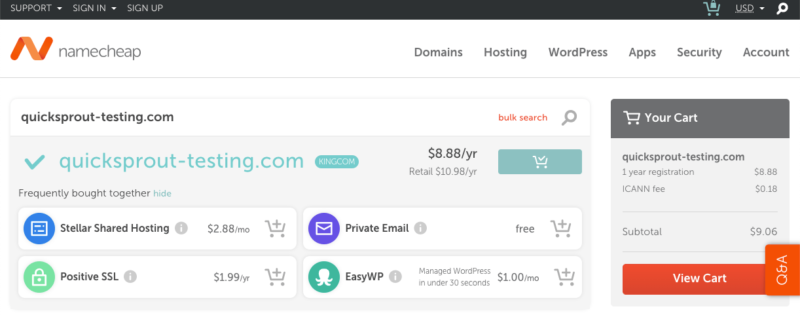
The Namecheap purchase flow is simple and straightforward.
Namecheap’s $0.18 Fee
That $0.18 ICANN fee is a mandatory charge from the Internet Corporation for Assigned Names and Numbers, for each domain registration, renewal, or transfer. It’s negligible, although noticeable, especially considering other registrars, including NameSilo, absorb the fee.
Free Domain Privacy
Namecheap provides a WhoisGuard subscription for free forever. You definitely want WhoisGuard. It’s a privacy protection that prevents your personal contact information from being displayed in the publicly accessible Whois database. (If you don’t have protection, you get spam. So much spam. We skilled WhoisGuard once years ago and are still getting spam phone calls…) As long as your domain is with Namecheap, you’ll never pay for WhoisGuard. GoDaddy, on the other hand, charges $10/year and most web hosts that offer domain registration charge $12/year. Note: Privacy is also free with Hover, Google Domains, NameSilo, and Gandi.
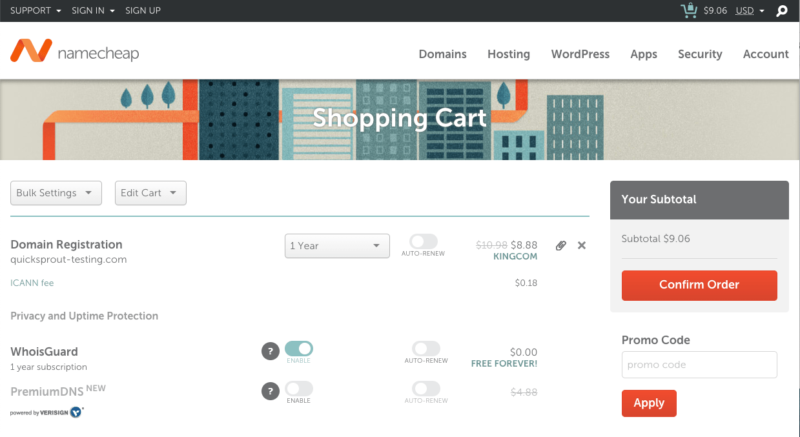
With Namecheap, WhoisGuard protection is free forever.
Skip the Upsells
-
- Stellar Shared Hosting ($2.88/month) – Skip it
You shouldn’t get your hosting from your domain registrar. They’re two very different competencies and we don’t know of any one company that nails them both. (If you’re after hosting, we’ve written a review of the best web hosts. TLDR: Our top pick for beginners is InMotion Hosting; for everyone else it’s SiteGround.)
- Stellar Shared Hosting ($2.88/month) – Skip it
-
- Private Email (two months free, then $9.88–$49.99/year) – Skip it
If you want a business email, it’s always free to forward emails from Namecheap. If you’d like cloud storage for that email, or to send emails from your domain name, we recommend not buying it from your registrar. Our universal recommendation is G Suite ($5/user/month), which includes Gmail, Drive, Docs, Sheets, Calendar, and Hangouts.
- Private Email (two months free, then $9.88–$49.99/year) – Skip it
-
- Professional Gmail ($5/user/month) – Probably skip it
This is the going price for G Suite, so you can buy it here now, or add it later, but we think it’s simpler to keep you billing for G Suite directly with Google. That way, if you ever leave Namecheap, you won’t have to get them to transfer you G Suite account back to Google.
- Professional Gmail ($5/user/month) – Probably skip it
-
- PositiveSSL ($1.99/year) – Skip it
You’ll need an SSL certificate if you plan to accept payments or collect other sensitive information on your website, but not this one. The PositiveSSL Namecheap is upselling here is just a Domain Verification. We recommend getting your SSL from your web host.
- PositiveSSL ($1.99/year) – Skip it
- EasyWP ($1/month) – Skip it
You’re here to buy your domain name and only your domain name. If you want managed WordPress hosting, we recommend using a top web host, focused on hosting and only hosting. SiteGround and Dreamhost both have some good managed WordPress built into their shared hosting plans.
Other Top Domain Registrars to Consider
NameSilo
At first glance NameSilo is laughable, especially compared to its competition. Its aesthetic seems to be late 90s Power Point — although a new site is thankfully in beta testing. (We suspect this is in large part due to NameSilo being acquired in early 2018 by software company Brision Innovations.)
What we appreciate about NameSilo: it’s a domain registrar and that’s it. It’s really cheap (even cheaper than Namecheap), throws in domain privacy for free (though you’ll need to opt-in by selecting it in your cart), and offers a full-blown discount program for bulk domain purchases. There are virtually no upsells and you can start configuring your domain in checkout — linking it to a third-party service (like a website builder) and entering custom NameServers. Customer support is also comparable, with a rich knowledge base and 24/7 live chat. If you don’t mind some (hopefully temporarily) outdated interfaces, NameSilo is a great option.
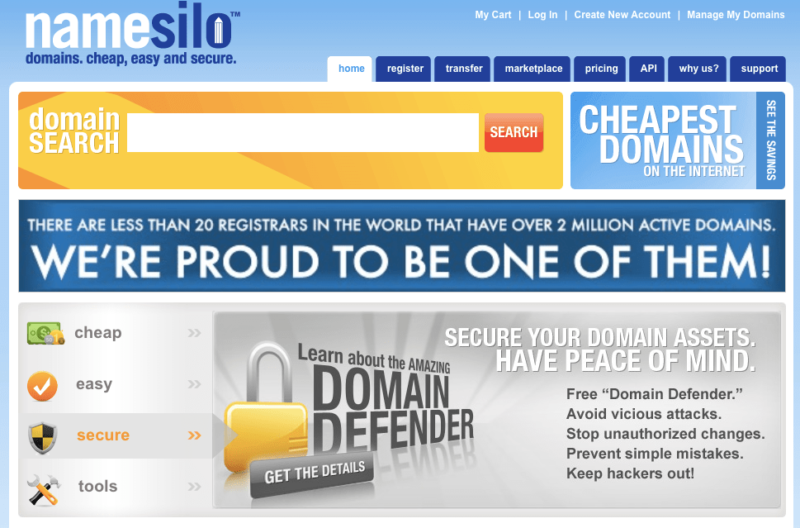
Outdated aesthetics are a real trust-breaker with NameSilo. But a new site is on its way!
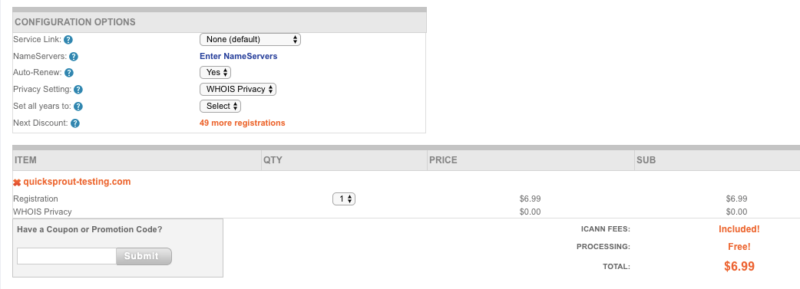
You can start configuring your domain name during NameSilo’s checkout flow. Don’t forget to opt-in to WHOIS privacy.
Google Domains
We like the familiar and simple Google-style interface: there are literally no upsells at all, and absolutely zero flourish. But: most web developers prefer not to share more information with Google than is absolutely necessary. There’s also very little documentation. If you need help, you won’t be able to dig into a rich knowledge base. There is chat, email, and phone support in English, 24 hours a day, and in French, Spanish, and Japanese with more limited hours.
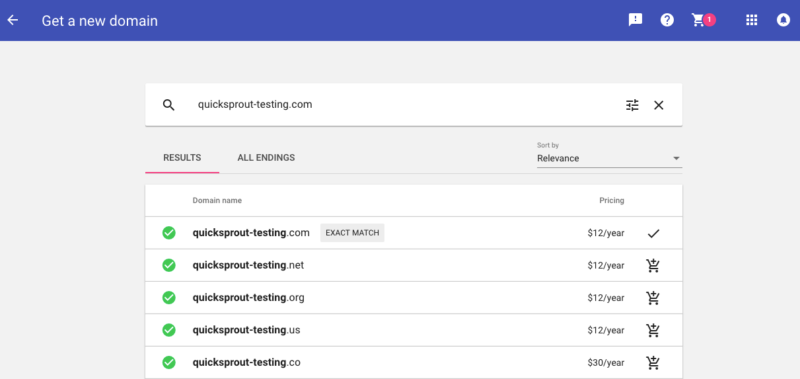
You’ll recognize the familiar Google styling: clean and straightforward.
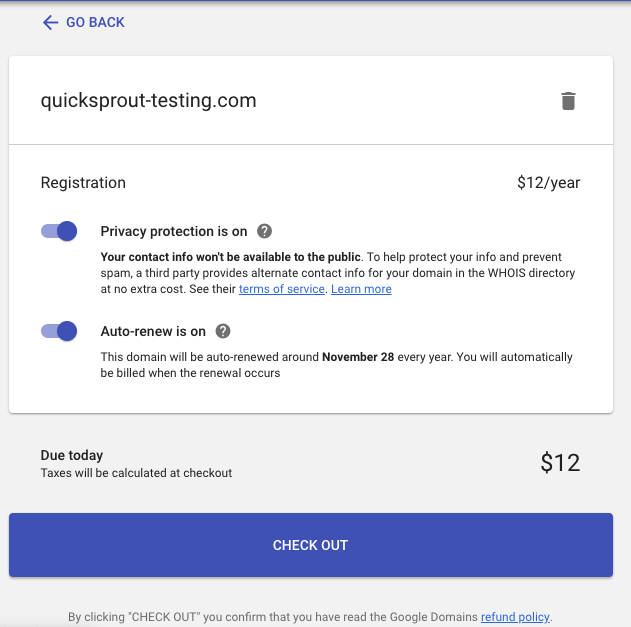
Google Domains makes no fanfare of its free privacy protection. Just make sure you turn it on.
Hover
We appreciate Hover’s recommendation engine in principle, but we think that choosing a brandable domain name is important enough that you shouldn’t be playing around with automated suggestions at the last minute. If you’re still tinkering with your URL, you’re probably not ready to buy. (Need help deciding? Read our guide on We do like that there are limited upsells in Hover’s purchase flow, and privacy protection is included (like with Namecheap). Email forward isn’t free though; it’s $5/month. Our biggest worry with Hover ultimately is its backend. Browse through Hover’s outage history and you’ll find hours-long outages are frequent.
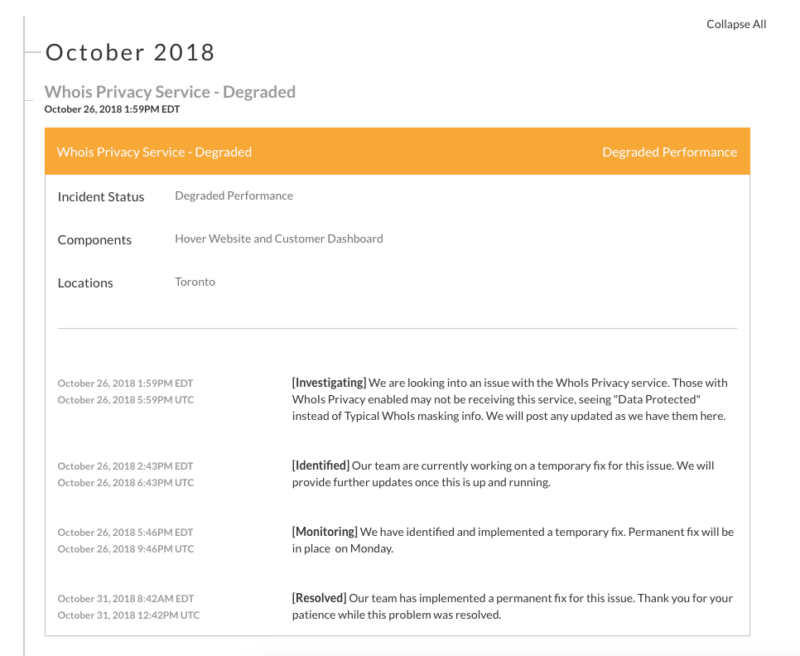
Hover’s Whois Privacy Service was degraded for days and the outage report is not robust.
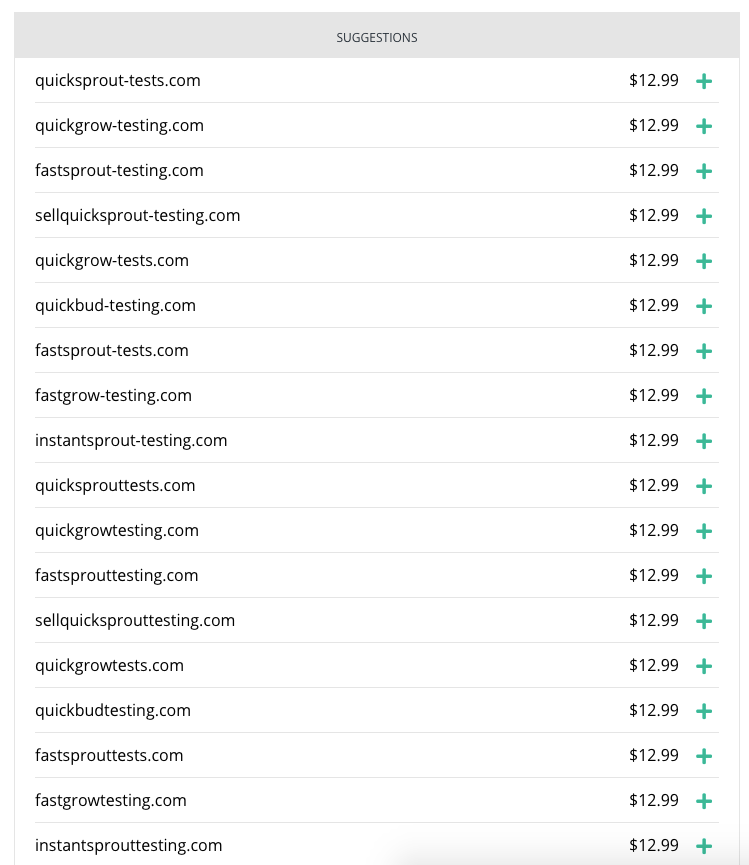
Hover spit our domain name request through a thesaurus.
Gandi
For over $15/year for the same domain we can get for $10–12/year, we want to see more from Gandi. It has a beautiful interface, and is well-regarded amongst developers, but there’s not much it offers that Namecheap or even Google Domains doesn’t: free domain privacy, free SSL for one year, email hosting. One standout is its domain bundles. You can score a deal if you want to buy multiple TLDs at once.
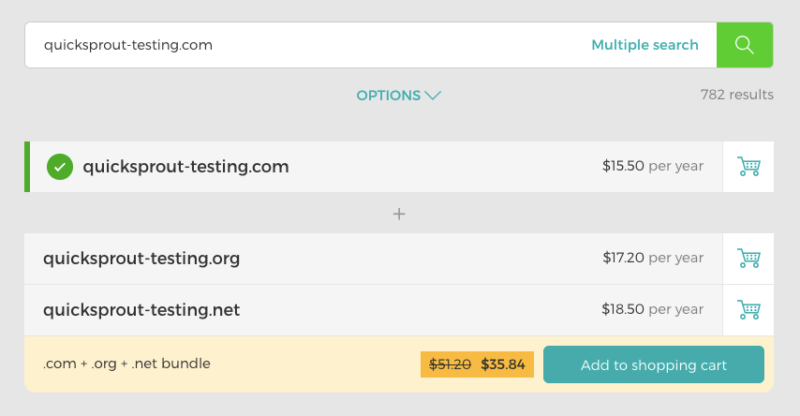
If you want to bundle popular TLDs, Gandi will give you a good deal.
Domain Registrars We Don’t Recommend
Avoid any registrar with a bad reputations and histories of poor customer support and billing practices. That includes Spamhaus’ entire list of worst domain registrars, as well as GoDaddy and 1&1, based off of tips from users on Reddit. (GoDaddy is even suspected of throttling outbound transfers. Not great.)
What to Know When Buying a Domain Name
Keep your domain separate from your web hosting provider.
A domain registrar should be just that: a domain registrar. While many web hosts and website builders offer domain registration as part of their services, typically as a step during the signup process, we generally recommend keeping those services separate. (And we’re not the only ones.)
Hosting your domain with a registrar and your website on a web host gives you a lot more flexibility and control should you ever decide to switch web hosting providers. It also makes managing multiple domains a lot less of a headache, and provides an additional layer of security should one service be compromised — if someone hacks your web host, they won’t be able to touch your domain, and vice versa.
It’s not a terrible thing to bundle your domain and hosting, especially if you’re only working on one website. It’s convenient, and web hosts and websites builders often promote a free domain as part of their hosting package, which can be tempting. Just know those offers usually only last for the first year, and web hosts will almost always have a higher domain renewal fee than a good domain registrar. And, if you ever want to move to a different web host, there’s a chance it’s going to be a major hassle. Make sure you read the fine print of your web host’s domain policy to make sure they’ll allow you to transfer it, should the need arise.
You definitely want domain privacy.
Always opt-in to domain privacy. Most domain registrars include it for free; those who don’t usually charge about $12/year. Buy it. It’s what keeps your personal information (including your name, phone number, email address, and mailing address) from being listed in the Whois public database — and therefore out of the hands of spammers. This may not be the case forever. Since the EU’s General Data Protection Regulation (GDPR) went into effect in May 2018, some registrars are not publishing their customer’s information to avoid liability, and many people suspect the entire Whois protocol will be overhauled in the near future. But, for now, it’s still our recommendation.
Beware of price jumps.
Domain registrars like to play around with promotional pricing — maybe you get the first year for a lower price, then it renews for its “regular” or “renewal” price. Anyone who has bought cable is familiar with this pricing structure. Buying a domain up front for long period of time (ICANN caps it at 10 years) will lock you into that renewal price, which comes in handy if you know you want that domain and can afford it. Domain registries can alter prices at their whim, like when Uniregistry jacked up the price on a handful of TLDs in early 2017. In one day, .hosting domains went from $20 to $300 and .blackfriday increased from about $10 to $100.
What is ICANN?
ICANN is the Internet Corporation for Assigned Names and Numbers. It’s a non-profit that’s responsible for coordinating the unique, specific names and numbers that identify your online presence — also known as domains and IP addresses. ICANN doesn’t own or operate domains and IP addresses; rather, it coordinates with domain registries and domain registrars, and acts as a central repository for IP addresses, to implement universal operating procedures that keep the internet running. It’s not unlike how cities manage naming streets and assigning home addresses: the city doesn’t own your house, but someone has to keep track of what it’s called. ICANN also requires domain registrars to provide accurate contact information for the owner of each domain, and to make that information publicly available through Whois.
Remember to turn on automatic renewal.
In a lot of businesses, auto-renewal is sneaky — a way to charge you for something you never use and forgot you bought in the first place. But when it comes to domain names, we absolutely recommend it. Forgetting to re-up means your site will go down, which happened to automated marketing powerhouse Marketo in 2017. Even worse, if you have a covetable domain name, it might get scooped up. That’s what happened to Google.com back in 2016.
Domain registrars don’t all have access to every domain name.
For the most part, if a name is available, you will probably be able to purchase it through any of the best domain registrars. But some accredited registrars only offer limited top-level domains (TLD). (A TLD is the stuff that comes after the dot.) This is especially common in smaller registrars, or providers that over domain registration as a secondary service, like a web host. (For example, InMotion Hosting, one of our favorite web hosts, can only register .com, .net, .org, .biz, .us, and .info domains.)
That’s because registrar is different than a registry. Registries are who actually hold the TLD and their associated names — for example, VeriSign controls all .com and .net domains while PIR controls all .org and .ngo domains. Registrars manage the reservations of the names provided by the registries, and have to act in accordance with each one they are involved with. Not all registrars work with all registries, which is why some only have access to specific TLDs.
How come some registrars charge more than others for the same domain?
Registrars are middlemen between you, the customer, and domain registries, who hold all the domains. It’s similar to how department stores are the middlemen between shoppers and clothing manufacturers. The registries set their prices — the equivalent of wholesale prices — and registrars add their fees on top. That’s how they make money. A registrar selling a domain for more money than its competitor is just making more money off the sale of the same product. (Some registrars are making headlines for registering domains “at cost,” including Cloudflare, the content delivery network provider. )
Recap: The Best Domain Registrar
You should buy your domain name from a registrar (not a web host) and you should not buy anything else from your domain registrar. You’re here for one thing and one thing only.
There are a number of registrar-only options including Google Domains, Gandi, Hover, and NameSilo — but we recommend Namecheap.
Namecheap has good prices and is the easiest to use. It’s what we use. There are a few upsells, but you can skip them, since the only one you really need is included for free: privacy protection.
Source Quick Sprout https://ift.tt/2SrneP9

ليست هناك تعليقات:
إرسال تعليق